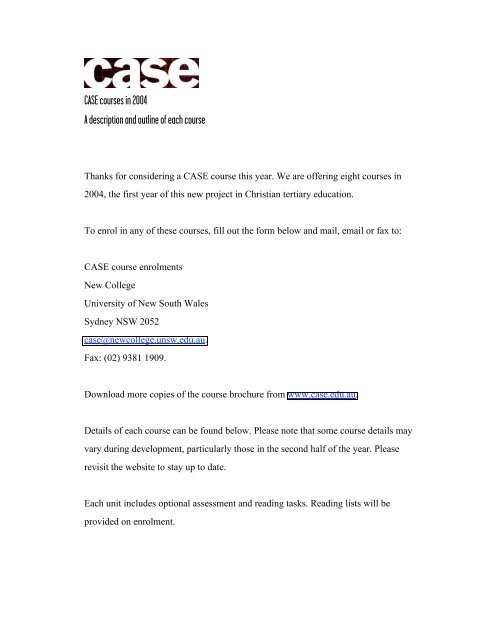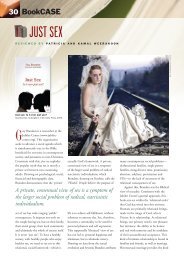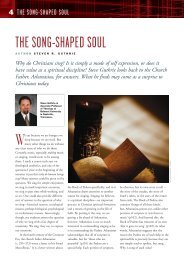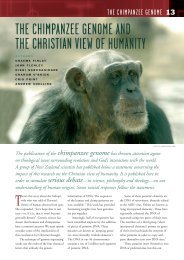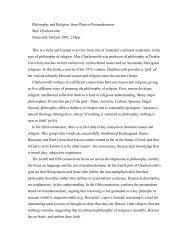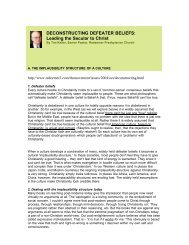CASE courses in 2004 A description and outline of each course
CASE courses in 2004 A description and outline of each course
CASE courses in 2004 A description and outline of each course
- No tags were found...
You also want an ePaper? Increase the reach of your titles
YUMPU automatically turns print PDFs into web optimized ePapers that Google loves.
<strong>CASE</strong> <strong><strong>course</strong>s</strong> <strong>in</strong> <strong>2004</strong><br />
A <strong>description</strong> <strong>and</strong> outl<strong>in</strong>e <strong>of</strong> <strong>each</strong> <strong>course</strong><br />
Thanks for consider<strong>in</strong>g a <strong>CASE</strong> <strong>course</strong> this year. We are <strong>of</strong>fer<strong>in</strong>g eight <strong><strong>course</strong>s</strong> <strong>in</strong><br />
<strong>2004</strong>, the first year <strong>of</strong> this new project <strong>in</strong> Christian tertiary education.<br />
To enrol <strong>in</strong> any <strong>of</strong> these <strong><strong>course</strong>s</strong>, fill out the form below <strong>and</strong> mail, email or fax to:<br />
<strong>CASE</strong> <strong>course</strong> enrolments<br />
New College<br />
University <strong>of</strong> New South Wales<br />
Sydney NSW 2052<br />
case@newcollege.unsw.edu.au.<br />
Fax: (02) 9381 1909.<br />
Download more copies <strong>of</strong> the <strong>course</strong> brochure from www.case.edu.au.<br />
Details <strong>of</strong> <strong>each</strong> <strong>course</strong> can be found below. Please note that some <strong>course</strong> details may<br />
vary dur<strong>in</strong>g development, particularly those <strong>in</strong> the second half <strong>of</strong> the year. Please<br />
revisit the website to stay up to date.<br />
Each unit <strong>in</strong>cludes optional assessment <strong>and</strong> read<strong>in</strong>g tasks. Read<strong>in</strong>g lists will be<br />
provided on enrolment.
The Lord <strong>of</strong> the R<strong>in</strong>gs: Magic, Science <strong>and</strong> Religion<br />
Presenter: Dr Kirsten Birkett.<br />
Kirsten holds a doctorate <strong>in</strong> history <strong>and</strong> philosophy <strong>of</strong> science<br />
from the University <strong>of</strong> New South Wales. She is the author <strong>of</strong> a<br />
number <strong>of</strong> books on science <strong>and</strong> religion, <strong>in</strong>clud<strong>in</strong>g Unnatural<br />
Enemies (Matthias Media).<br />
Week 1 Magic as religion<br />
In the ancient world magic <strong>and</strong> religion were <strong>in</strong>tertw<strong>in</strong>ed. This sem<strong>in</strong>ar explores the<br />
difficulties <strong>of</strong> def<strong>in</strong>ition when religion is essentially magical. Anthropological <strong>and</strong><br />
medieval def<strong>in</strong>itions <strong>of</strong> magic <strong>and</strong> religion will be exam<strong>in</strong>ed.<br />
Week 2 Magic as science<br />
Dur<strong>in</strong>g the Middle Ages <strong>in</strong> particular, ‘learned’ magic fulfilled the place <strong>of</strong> science, an<br />
attempt to underst<strong>and</strong> the mechanisms <strong>of</strong> the world based on neo-Platonic cosmology.<br />
Week 3 Protestants <strong>and</strong> Catholics<br />
Crucial differences between Reformation <strong>and</strong> Medieval theology separated Protestant<br />
religion from the magical past.<br />
Week 4 Magic <strong>of</strong> technology v. magic <strong>of</strong> nature<br />
The Scientific Revolution saw science <strong>and</strong> technology as the noble <strong>and</strong> wondrous<br />
servants <strong>of</strong> civilization, a view <strong>of</strong> science that cont<strong>in</strong>ues today <strong>in</strong> the idealism <strong>of</strong><br />
communication br<strong>in</strong>g<strong>in</strong>g democracy <strong>and</strong> peace, medic<strong>in</strong>e cur<strong>in</strong>g all ills <strong>and</strong> technology<br />
feed<strong>in</strong>g the masses. On the other h<strong>and</strong>, The Lord <strong>of</strong> the R<strong>in</strong>gs reflects an <strong>in</strong>creas<strong>in</strong>gly<br />
popular yearn<strong>in</strong>g for the magic <strong>of</strong> nature; technology is not only used for evil, it is<br />
<strong>in</strong>herently despoil<strong>in</strong>g <strong>and</strong> corrupt<strong>in</strong>g.
The Challenge <strong>of</strong> Colonial Christianity<br />
Presenter: Mr Stuart Johnson<br />
Stuart Johnson is complet<strong>in</strong>g a doctorate <strong>in</strong> Australian history at the University <strong>of</strong> New<br />
South Wales. He holds a Masters <strong>in</strong> Theology <strong>and</strong> is a board member <strong>of</strong> the Macquarie<br />
Christian Studies Institute.<br />
This <strong>course</strong> exam<strong>in</strong>es the nature <strong>and</strong> impact <strong>of</strong> mid-n<strong>in</strong>eteenth century Christianity <strong>in</strong><br />
colonial N.S.W. It focuses on Evangelical Christianity, which was the dom<strong>in</strong>ant<br />
expression <strong>of</strong> the Christian faith at this time. It looks at sermons <strong>and</strong> strategies,<br />
newspapers <strong>and</strong> conference reports as well as the home, work <strong>and</strong> church lives <strong>of</strong><br />
prom<strong>in</strong>ent Christians such as John Fairfax <strong>of</strong> the Sydney Morn<strong>in</strong>g Herald. Set amidst the<br />
wider story <strong>of</strong> the discovery <strong>of</strong> gold <strong>and</strong> burgeon<strong>in</strong>g migration from Brita<strong>in</strong> <strong>and</strong> Irel<strong>and</strong>,<br />
the story <strong>of</strong> colonial Christianity does more than br<strong>in</strong>g to light a lost heritage. It<br />
challenges today’s Christians, who walk the same streets, to consider (as one colonial<br />
pastor put it) their own ‘personal service to their generation’.<br />
Week 1: Explod<strong>in</strong>g the Myth <strong>of</strong> Religious Unbelief <strong>in</strong> Australia<br />
One powerful <strong>and</strong> erroneous myth with<strong>in</strong> Australian culture is the claim that religious<br />
belief has always been <strong>of</strong> marg<strong>in</strong>al importance. The study <strong>of</strong> colonial society explodes<br />
this myth. Christian belief ga<strong>in</strong>ed major expression with<strong>in</strong> colonial popular culture.<br />
Governments were committed to the promotion <strong>of</strong> the Christian faith <strong>and</strong> Christians<br />
worked energetically to promote the gospel <strong>and</strong> to improve society. This lecture explores<br />
the notable presence <strong>of</strong> Christian belief <strong>and</strong> activity with<strong>in</strong> colonial society <strong>and</strong> the<br />
general features <strong>of</strong> Evangelicalism at this time.
Week 2: Proclaim<strong>in</strong>g the gospel<br />
This lecture explores the efforts <strong>and</strong> self-sacrific<strong>in</strong>g zeal <strong>of</strong> colonial Christians <strong>in</strong><br />
proclaim<strong>in</strong>g the gospel. Urban mission such as the Sydney City Mission <strong>and</strong> Mar<strong>in</strong>er’s<br />
Church, societies dedicated to evangelism <strong>and</strong> Christian <strong>in</strong>struction (such as the<br />
Y.M.C.A), <strong>and</strong> the diverse <strong>and</strong> energetic m<strong>in</strong>istries <strong>of</strong> local churches <strong>and</strong> their great<br />
commitment to plant<strong>in</strong>g new churches are highlighted. Case studies <strong>in</strong>clude the letters <strong>of</strong><br />
church planters <strong>in</strong> newly settled districts which reveal the enormous hardship <strong>and</strong> many<br />
anxieties they endured liv<strong>in</strong>g out their passion to see people turn to Christ.<br />
Week 3: Reform<strong>in</strong>g Society<br />
A remarkable expression <strong>of</strong> Christian belief <strong>in</strong> colonial society was its commitment to the<br />
reformation <strong>of</strong> society. It was the age <strong>of</strong> voluntary societies, through which Christians<br />
(<strong>and</strong> others) provided relief to the impoverished, unemployment services, <strong>and</strong> promoted<br />
literacy <strong>and</strong> self-improvement. Great efforts were made to <strong>in</strong>fluence public policy<br />
regard<strong>in</strong>g matters as diverse as the consumption <strong>of</strong> alcohol (an even bigger problem then<br />
than now), Sabbath observance, state support <strong>of</strong> churches, <strong>and</strong> education. Evangelicals<br />
differed as to the best way forward, at times bitterly so. But all were animated with the<br />
belief that it was their duty to be engaged <strong>in</strong> prom<strong>in</strong>ent social issues.<br />
Week 4: The Challenge <strong>of</strong> Colonial Christianity<br />
The zeal <strong>of</strong> colonial evangelical Christians is considered <strong>in</strong> the light <strong>of</strong> contemporary<br />
Christian experience. Areas <strong>of</strong> similarity <strong>and</strong> difference <strong>in</strong> cultural context <strong>and</strong> Christian<br />
practice are explored. The optimistic view <strong>of</strong> the future <strong>of</strong> human society <strong>of</strong> the midn<strong>in</strong>eteenth<br />
century is discussed <strong>in</strong> relation to theology (eschatology) <strong>and</strong> the likely<br />
stimulus this gave colonial Christians. Participants will be encouraged to consider what<br />
has challenged <strong>and</strong> <strong>in</strong>terested them most <strong>in</strong> this <strong>course</strong>.
How will the world end Stories <strong>of</strong> the apocalypse<br />
Presenter: Dr Greg Clarke<br />
Greg Clarke is Director <strong>of</strong> <strong>CASE</strong>. His doctorate exam<strong>in</strong>ed<br />
eschatology <strong>in</strong> twentieth century literature <strong>and</strong> he has published<br />
an <strong>in</strong>teractive study on the Book <strong>of</strong> Revelation (The Vision<br />
Statement, Matthias Media, 2003).<br />
Week 1: Key texts for underst<strong>and</strong><strong>in</strong>g the end.<br />
An overview <strong>of</strong> the ma<strong>in</strong> texts <strong>in</strong> the Western tradition from which our underst<strong>and</strong><strong>in</strong>g <strong>of</strong><br />
eschatology is taken. Focuses specifically on the Book <strong>of</strong> Revelation. Outl<strong>in</strong>es Christian<br />
views <strong>of</strong> the end <strong>and</strong> some literary reactions to them, <strong>in</strong>clud<strong>in</strong>g D. H. Lawrence, T.S.<br />
Eliot <strong>and</strong> James Joyce.<br />
Week 2: Romanc<strong>in</strong>g the end.<br />
An overview <strong>of</strong> the significance <strong>of</strong> the apocalypse for the Romantics. Includes a detailed<br />
look at the <strong>in</strong>fluence <strong>of</strong> William Blake’s poetry <strong>and</strong> draw<strong>in</strong>gs.<br />
Week 3: Apocalypse down under.<br />
Exam<strong>in</strong><strong>in</strong>g some Australian depictions <strong>of</strong> the end <strong>of</strong> the world, <strong>in</strong>clud<strong>in</strong>g Dr Wooreddy’s<br />
Prescription for Endur<strong>in</strong>g the End <strong>of</strong> the World <strong>and</strong> a selection <strong>of</strong> modern Australian<br />
poetry.<br />
Week 4: Apocalypse stories <strong>in</strong> science <strong>and</strong> science fiction.<br />
Looks at what science knows about the future <strong>and</strong> how it is presented <strong>in</strong> narrative form <strong>in</strong><br />
both novels <strong>and</strong> film.
Edges <strong>of</strong> life: Christian approaches to bioethical issues<br />
Presenter: Dr Megan Best<br />
Megan Best is a medical doctor with a background <strong>in</strong><br />
palliative medic<strong>in</strong>e. She is a federal advisor on human<br />
clon<strong>in</strong>g <strong>and</strong> a member <strong>of</strong> the Archbishop <strong>of</strong> Sydney’s<br />
Social Issues Executive. She lectures <strong>in</strong> Health Law <strong>and</strong><br />
Medical Ethics at the University <strong>of</strong> New South Wales.<br />
Week 1: Biotechnology <strong>in</strong> our society<br />
Why is biotech so popular We look at the underly<strong>in</strong>g assumptions <strong>in</strong> our community<br />
dialogue, how our perceptions are shaped by the media, <strong>and</strong> exam<strong>in</strong>e the de-power<strong>in</strong>g <strong>of</strong><br />
the voice <strong>of</strong> caution.<br />
Week 2: Personhood: who has moral st<strong>and</strong><strong>in</strong>g<br />
We exam<strong>in</strong>e philosophical arguments for when life beg<strong>in</strong>s <strong>and</strong> the implications which<br />
arise from them. We will also exam<strong>in</strong>e current biotechnology strategies to f<strong>in</strong>d what<br />
implications for moral st<strong>and</strong><strong>in</strong>g will arise for members <strong>of</strong> our society who are already<br />
among us.<br />
Week 3: Issues at the beg<strong>in</strong>n<strong>in</strong>g <strong>of</strong> life: who will live<br />
We will cover the arguments for <strong>and</strong> aga<strong>in</strong>st embryo experimentation.<br />
Week 4: Issues at the end <strong>of</strong> life: who will die<br />
We look at term<strong>in</strong>al illness, liv<strong>in</strong>g wills <strong>and</strong> the arguments for <strong>and</strong> aga<strong>in</strong>st euthanasia <strong>and</strong><br />
physician-assisted suicide.
Epistemology <strong>and</strong> Alv<strong>in</strong> Plant<strong>in</strong>ga: challenges for Christian philosophy<br />
Presenter: Rev Dr Keith Mascord<br />
Keith Mascord’s doctorate considered the philosophy <strong>of</strong><br />
Alv<strong>in</strong> Plant<strong>in</strong>ga. Keith lectures at Moore Theological<br />
College <strong>and</strong> pastors Green Square Christian Church <strong>in</strong><br />
Sydney.<br />
Wk 1: Reformed Epistemology: a new <strong>and</strong> fairly old approach to religiious<br />
Knowledge<br />
An <strong>in</strong>troduction to the developments <strong>in</strong> analytical philosophy over the past thirty years,<br />
with a special focus on how Christians have contributed.<br />
Wk 2: Theistic <strong>and</strong> Christian belief that doesn't need evidence<br />
Exam<strong>in</strong>es Alv<strong>in</strong> Plant<strong>in</strong>ga’s controversial attempt to solve some <strong>of</strong> the questions<br />
surround<strong>in</strong>g the nature <strong>of</strong> beliefs. Introduces the idea <strong>of</strong> beliefs that are ‘properly basic’.<br />
Wk 3: Is there really no need for evidence<br />
Further exam<strong>in</strong>ation <strong>of</strong> Plant<strong>in</strong>ga’s argument about the relationship between belief <strong>and</strong><br />
evidence. Includes discussion on how to talk about beliefs <strong>and</strong> evidence when debat<strong>in</strong>g<br />
the claims <strong>of</strong> Christianity.<br />
Wk 4: The strengths <strong>and</strong> weaknesses <strong>of</strong> Reformed Epistemology<br />
An assessment <strong>of</strong> Plant<strong>in</strong>ga <strong>and</strong> others <strong>in</strong> the light <strong>of</strong> biblical theology <strong>and</strong> the Scriptures<br />
. How successful is their philosophy, <strong>and</strong> how does it affect theology Is Reformed<br />
epistemology the best way to th<strong>in</strong>k about div<strong>in</strong>e knowledge
Christianity <strong>and</strong> the History <strong>of</strong> Fem<strong>in</strong>ism<br />
Presenter: Dr Kirsten Birkett<br />
Kirsten holds a doctorate <strong>in</strong> history <strong>and</strong> philosophy <strong>of</strong> science<br />
from the University <strong>of</strong> New South Wales. She is the author <strong>of</strong><br />
a number <strong>of</strong> books, <strong>in</strong>clud<strong>in</strong>g The Essence <strong>of</strong> Fem<strong>in</strong>ism<br />
(Matthias Media).<br />
Week 1:N<strong>in</strong>eteenth-century evangelicals<br />
The n<strong>in</strong>eteenth century <strong>in</strong> Engl<strong>and</strong> saw any number <strong>of</strong> reform<strong>in</strong>g social movements.<br />
Evangelicals were lead<strong>in</strong>g activists <strong>in</strong> a number <strong>of</strong> fields, from emancipation <strong>of</strong> slaves to<br />
protection <strong>of</strong> prostitutes.<br />
Week 2 Women <strong>and</strong> careers: Jane Austen, George Eliot <strong>and</strong> Dorothy Sayers<br />
Jane Austen wrote her brilliant novels from what is usually seen as a repressive Christian<br />
home. George Eliot left her evangelical belief to live with a married man, <strong>and</strong> was an<br />
anti-Christian activist <strong>and</strong> novelist. Dorothy Sayers was one <strong>of</strong> the first women to<br />
graduate from Oxford, <strong>and</strong> a great fiction writer <strong>and</strong> defender <strong>of</strong> Christianity. What do<br />
the lives <strong>of</strong> these three talented English women say about fem<strong>in</strong>ism, Christianity <strong>and</strong><br />
women’s work<br />
Week 3 The <strong>in</strong>dustrial revolution <strong>and</strong> the work<strong>in</strong>g class<br />
The entry <strong>of</strong> women <strong>in</strong>to the workforce was a middle-class phenomenon; work<strong>in</strong>g-class<br />
women had always worked for money, both <strong>in</strong>side <strong>and</strong> outside the home, before <strong>and</strong> after<br />
the <strong>in</strong>dustrial revolution.<br />
Week 4 Christianity <strong>and</strong> a few myths <strong>of</strong> fem<strong>in</strong>ism<br />
Who were the fem<strong>in</strong>ists Why has the church such an anti-woman reputation Why has<br />
fem<strong>in</strong>ism such a pro-woman reputation What do women actually want today
Christianity <strong>and</strong> postmodernism<br />
Presenter: Dr Greg Clarke<br />
Greg Clarke (Ph.D., Sydney) is director <strong>of</strong> <strong>CASE</strong>. He also lectures<br />
on postmodernism at Moore Theological College.<br />
Week 1: Where did postmodernism come from<br />
An <strong>in</strong>troduction to the period <strong>of</strong> change that took the West from modernity to<br />
postmodernity. What causes can be identified for this change, <strong>and</strong> what symptoms <strong>of</strong> the<br />
change are evident Includes a brief overview <strong>of</strong> postmodernism <strong>in</strong> literature, philosophy,<br />
architecture <strong>and</strong> the arts, <strong>and</strong> an exam<strong>in</strong>ation <strong>of</strong> theological issues aris<strong>in</strong>g from the move<br />
beyond modernism.<br />
Week 2: Derrida, Foucault, Rorty<br />
An <strong>in</strong>troduction to three very different postmodern philosophers, <strong>and</strong> a Christian<br />
engagement with their work. No prior knowledge <strong>of</strong> their work is assumed.<br />
Week 3: Spirit, body <strong>and</strong> mach<strong>in</strong>e: the postmodern self <strong>in</strong> the technological age<br />
An exam<strong>in</strong>ation <strong>of</strong> postmodern challenges to Christian views <strong>of</strong> the self. Includes<br />
discussion <strong>of</strong> how the postmodern self is explored <strong>in</strong> recent films.<br />
Week 4: Postmodernism among the theologians<br />
How is postmodernism affect<strong>in</strong>g theology <strong>and</strong> the church, <strong>and</strong> what k<strong>in</strong>ds <strong>of</strong> responses to<br />
it have theologians given This sem<strong>in</strong>ar exam<strong>in</strong>es a range <strong>of</strong> reactions, from embrace to<br />
caution to rejection.
Relationism: an approach to bus<strong>in</strong>ess <strong>and</strong> beyond<br />
Presenters: Dr Bill Hurditch <strong>and</strong> Mr John Campbell<br />
Bill Hurditch (Ph.D., UNE) is a pr<strong>in</strong>cipal<br />
<strong>and</strong> director <strong>of</strong> The Fifth Estate<br />
Consultancy Pty Ltd. John Campbell is<br />
pr<strong>in</strong>cipal consultant at Focalpo<strong>in</strong>t<br />
Organisation Development Pty Ltd.<br />
This short <strong>course</strong> will exam<strong>in</strong>e the nature <strong>and</strong> significance <strong>of</strong> personal relationships as a<br />
focus for bus<strong>in</strong>ess <strong>and</strong> life, public <strong>and</strong> private. Relationism is an ideology applicable to<br />
private as well as societal life. Accord<strong>in</strong>g to relationism, the central importance <strong>of</strong><br />
personal relationships, such as is attested, for example, <strong>in</strong> the aphorism 'you are a person<br />
only because <strong>of</strong> other people', ought to dramatically change the way we view our<br />
workplace, our clients, our family, our social club—<strong>in</strong> fact, all our private <strong>and</strong> public<br />
affairs.<br />
The <strong>course</strong> takes much <strong>of</strong> its material from the pioneer<strong>in</strong>g work <strong>of</strong> Michael Schluter,<br />
whose 1993 book The R Factor 1 set out the seeds <strong>of</strong> a new approach to shap<strong>in</strong>g public<br />
policy with relational th<strong>in</strong>k<strong>in</strong>g at its core.<br />
Based on the moral <strong>and</strong> ethical pr<strong>in</strong>ciples <strong>of</strong> Judeo-Christian t<strong>each</strong><strong>in</strong>g, relationism has<br />
much to say about the way we ought to conduct our bus<strong>in</strong>ess affairs. For example, a<br />
relational approach to bus<strong>in</strong>ess will replace money with personal relationships as the hub<br />
<strong>in</strong> the wheel <strong>of</strong> one’s bus<strong>in</strong>ess enterprise, viz:<br />
In the biblical view <strong>of</strong> the world, relationships, rather than money,<br />
should be the measure <strong>of</strong> all th<strong>in</strong>gs. Any move to effect such a<br />
transformation must beg<strong>in</strong> with conceptual changes: we need to be
able to th<strong>in</strong>k, speak <strong>and</strong> evaluate relationally rather than simply<br />
f<strong>in</strong>ancially… 2<br />
The <strong>course</strong> presenters, Bill Hurditch <strong>and</strong> John Campbell, have both explored <strong>and</strong> applied<br />
relational pr<strong>in</strong>ciples <strong>in</strong> their bus<strong>in</strong>esses. Bill is a pr<strong>in</strong>cipal <strong>of</strong> The Fifth Estate<br />
Consultancy, a firm specialis<strong>in</strong>g <strong>in</strong> corporate advocacy for major resource projects. John’<br />
s company, Focalpo<strong>in</strong>t Organisation Development specialises <strong>in</strong> leadership <strong>and</strong> team<br />
coach<strong>in</strong>g <strong>and</strong> tra<strong>in</strong><strong>in</strong>g.<br />
The <strong>course</strong> will <strong>in</strong>clude both theoretical <strong>and</strong> practical material to provide participants<br />
with an appreciation <strong>of</strong> how they can better encourage <strong>and</strong> manage their bus<strong>in</strong>ess <strong>and</strong><br />
personal life along relational l<strong>in</strong>es. These <strong>in</strong>clude an explanation <strong>of</strong> the concept <strong>of</strong><br />
relational proximity, mapp<strong>in</strong>g <strong>of</strong> an <strong>in</strong>dividual’s relational base, <strong>and</strong> conduct<strong>in</strong>g<br />
relational audits <strong>of</strong> vocational <strong>and</strong> private situations. In addition we will be exam<strong>in</strong><strong>in</strong>g<br />
several aspects <strong>of</strong> organizational <strong>and</strong> bus<strong>in</strong>ess life from a relational perspective.<br />
………………….<br />
1<br />
Schluter, M. <strong>and</strong> Lee, D. 1993. The R Factor. Hodder & Stoughton, London. A second book by Schluter<br />
<strong>and</strong> Lee was published <strong>in</strong> 2003. Entitled The R Option: Build<strong>in</strong>g relationships as a better way <strong>of</strong> life, this<br />
book puts some real-life flesh on the bones <strong>of</strong> the relational pr<strong>in</strong>ciples established <strong>in</strong> The R Factor.<br />
1<br />
Spencer, N. 2003. The Measure <strong>of</strong> All Th<strong>in</strong>gs – A biblical perspective on money <strong>and</strong> value Brita<strong>in</strong> today.<br />
Jubilee Centre, Cambridge.


